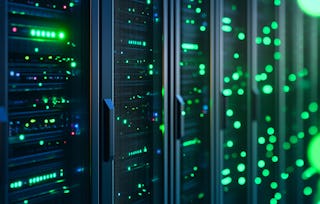This course is designed to provide a full overview of computer networking. We’ll cover everything from the fundamentals of modern networking technologies and protocols to an overview of the cloud to practical applications and network troubleshooting.

The Bits and Bytes of Computer Networking
Seize the savings! Get 40% off 3 months of Coursera Plus and full access to thousands of courses.

The Bits and Bytes of Computer Networking
This course is part of Google IT Support Professional Certificate

Instructor: Google Career Certificates
1,014,879 already enrolled
Included with
52,433 reviews
Skills you'll gain
Tools you'll learn
Details to know

Add to your LinkedIn profile
31 assignments
See how employees at top companies are mastering in-demand skills

Build your Networking expertise
- Learn new concepts from industry experts
- Gain a foundational understanding of a subject or tool
- Develop job-relevant skills with hands-on projects
- Earn a shareable career certificate from Google

There are 6 modules in this course
Earn a career certificate
Add this credential to your LinkedIn profile, resume, or CV. Share it on social media and in your performance review.
Instructor

Offered by
Explore more from Networking
 Status: Free Trial
Status: Free Trial Status: Free Trial
Status: Free Trial Status: Free Trial
Status: Free Trial Status: Preview
Status: Preview
Why people choose Coursera for their career

Felipe M.

Jennifer J.

Larry W.

Chaitanya A.
Learner reviews
- 5 stars
79.17%
- 4 stars
16.03%
- 3 stars
3.10%
- 2 stars
0.87%
- 1 star
0.80%
Showing 3 of 52433
Reviewed on Nov 26, 2020
The course gives a good overview over the computer networking, not going very deep. Quizzes are very useful for learning process. Graphical materials that given during video lessons could be improved.
Reviewed on Nov 12, 2020
This course was definitely more difficult than the first one in this series, but it still broke down computer networking in an accessible way. I learned a lot in this course, and I had fun doing it.
Reviewed on Dec 30, 2020
The course had some ups and downs, but it was a good challenge and I did it! I learned so much and I never knew I could do this kind of course. I have gained so much knowledge now from when I started.

Open new doors with Coursera Plus
Unlimited access to 10,000+ world-class courses, hands-on projects, and job-ready certificate programs - all included in your subscription
Advance your career with an online degree
Earn a degree from world-class universities - 100% online
Join over 3,400 global companies that choose Coursera for Business
Upskill your employees to excel in the digital economy

